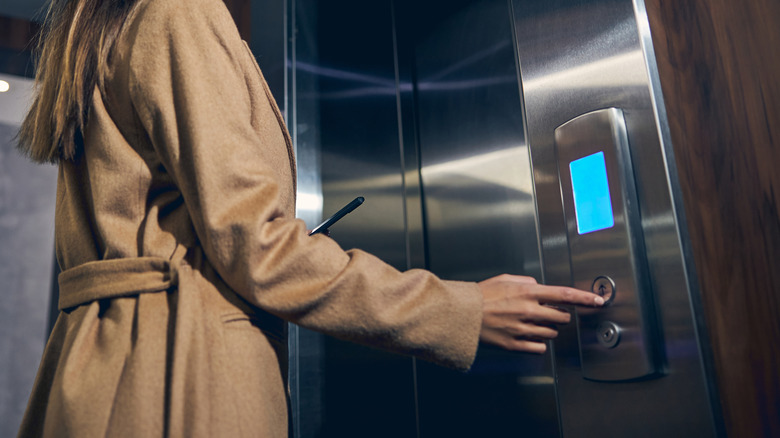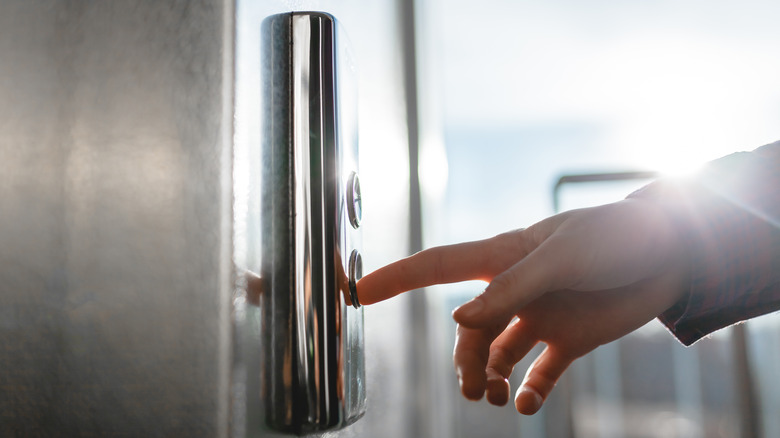What It Really Means When You Dream About An Elevator
You may or may not make much of a dream once you wake up the next morning, but did you know that everyone dreams at night? In fact, Medical News Today reports that all of us dream at least three to six times every night, but we can't remember 95% of those dreams when we wake up. Long ago, dreams were considered to be messages from the divine or signs about what's to come, according to Dreams. Over the years, theorists and scholars have tried to answer some crucial questions surrounding dreams. Why do we dream? What do those dreams mean? How do we interpret them, if at all?
While some theories like Freud's theory of wish-fulfillment and threat simulation theory found correlations between what we see during REM sleep and life in general, others concluded that dreams are nothing but a product of signal activity in our brain. There is also some consensus on what happens to our bodies when we dream. Dream analyst Lauri Quinn Loewenberg thinks that dreams are an insight into ourselves. "In my experience, people are beginning to be more open to the fact that dreams are more than random misfirings of the brain, and that they are telling us something about ourselves," she shares with Dreams.
Whether you believe in the meaning of dreams or not, some of them leave imprints on our minds that are difficult to shake off come morning, one of which could be a dream about an elevator.
A dream about an elevator can take many forms
You might want to start off with recollecting the location of the elevator in your dream to get a better understanding of what area of your life it could apply to, according to Exemplore. Was it at your apartment building, workplace, or somewhere else? A fantastical venue could relate to your spiritual or emotional life. Dreams about elevators often fall within one of a few categories — one that is going up, going down, standing still/stuck, or plunging down, for instance (via Dreaming and Sleeping). It could also be about you missing an elevator or getting into a crowded one.
The meaning behind this dream can be both positive and negative. An elevator that's going down could mean that you're gaining more insight into yourself from your past traumas, according to night dream practitioner Melody Paasch. On the flip side, it could also mean that you're being pulled toward past wounds and losing yourself in the process. An elevator that is going up could be a sign of success to come, reports Exemplore, while the negative side of it could mean that you've bitten off more than you can chew or that you're impatient.
If you feel trapped in life (whether at work, romantically, etc.), you may dream of being stuck in an elevator. Further, if you dream about continuously landing on one particular floor, it might be a sign that there's nothing more you can do about a particular situation in your life.
Dreaming about an elevator could have a totally different meaning
Although unusual in real life, you could dream about an elevator that is moving horizontally, and this could be a sign that you're missing the big picture, per Dreams and Sleeping. Your everyday life might feel hectic, but you might be just sweating the small stuff (via Millers Guild). If the elevator you're in is moving at a snail's pace, this could be your subconscious telling you to pick a lane, make a decision, and get moving. Alternately, if it's whizzing by too fast, this could mean that you should take your time with a course of action.
While an empty elevator doesn't necessarily signify anything, one that is crowded could be a sign of imminent danger, according to Dreams and Sleeping. A missed elevator might just be an indication of a problem you bypassed. Numbers are also a significant feature in elevator dreams, reports Exemplore. If you do see any numbers highlighted in the elevator buttons, they could relate back to a specific instance, event, or time in your life.
The dream world is a fascinating one, to say the least. Recurring or otherwise, dreams can mean something. They force us to become more introspective. Dream analyst Lauri Quinn Loewenberg calls it a form of therapy. "Those of us that are dream researchers and who use dream work in our mental health practices have found that dream interpretations are the deepest form of therapy available," she tells Dreams.


